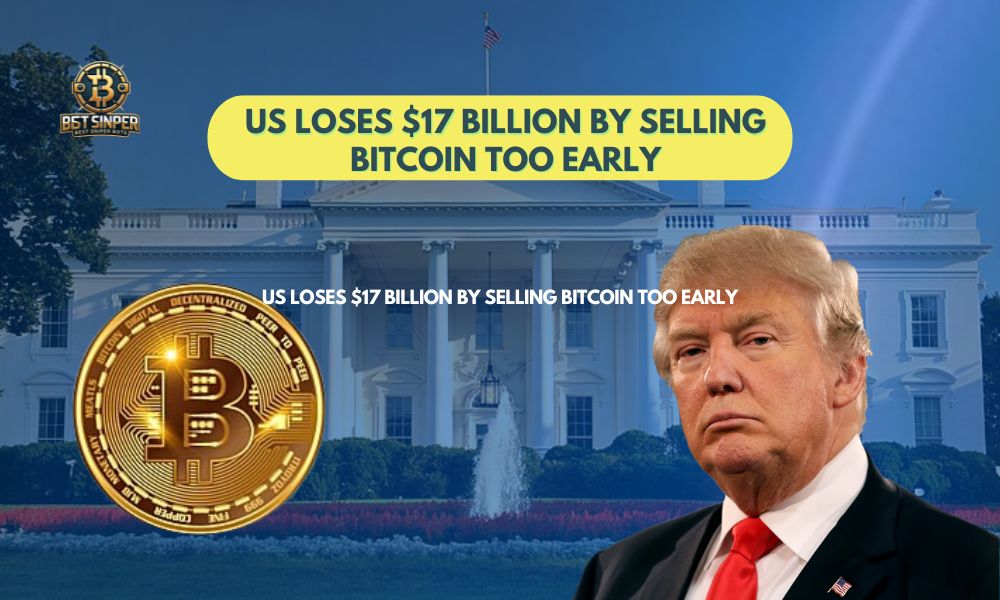The US loses $17 billion by selling Bitcoin too early, a shocking disclosure from the White House on March 10, 2025. The U.S. Government sold 195,000 BTC for just $366 million in 2014–2015, but those coins are now worth $17 billion at $87,000 each. President Donald Trump’s strategic Bitcoin reserve marks a transformative shift for U.S. crypto policy.

Contents
Costly Blunder: US Loses $17 Billion by Selling Bitcoin Too Early
As reported by Bitcoin.com News on X at 12:32 AM UTC on March 10, 2025, the US loses $17 billion by selling Bitcoin too early after the U.S. Government sold 195,000 Bitcoin (BTC) for only $366 million in auctions from 2014 to 2015. At the time, Bitcoin’s price averaged about $1,900 per coin, but with today’s value nearing $87,000 per BTC, those assets would now be worth $17 billion. This enormous financial loss, labeled a strategic misstep by the White House, underscores the volatility and potential of cryptocurrencies.
The mistake stemmed from the U.S. Marshals Service liquidating Bitcoin seized from criminal activities, such as cybercrimes. At that time, Bitcoin was widely misunderstood, viewed as a speculative and unstable investment rather than a durable store of value. However, its explosive growth over the past decade – fueled by institutional adoption, halving events, and Bitcoin ETF approvals – has transformed this decision into a painful lesson for policymakers, triggering intense discussions on enhancing cryptocurrency management. This revelation has heightened criticism of past government decisions, stressing the importance of greater crypto expertise among federal agencies.
Trump’s Ambitious Plan: Creating a Strategic Bitcoin Reserve
In response to this loss, President Donald Trump unveiled a pioneering policy: a Strategic Bitcoin Reserve with a “never sell” commitment, introduced in early March 2025. This move represents the most crypto-supportive stance from a U.S. president, aiming to position the U.S. as a global leader in digital assets.
The reserve is designed to accumulate Bitcoin rather than offload it, ensuring the U.S. avoids repeating the billion-dollar error. Trump also appointed a “Crypto Czar” at the White House to oversee digital asset initiatives, signaling a robust embrace of blockchain technology. This policy not only seeks to reclaim lost opportunities but also raises speculation about whether the U.S. could become the world’s largest “Bitcoin whale.” While celebrated as forward-thinking, the plan faces skepticism over its practicality amid political and economic challenges, including potential market disruptions from government intervention in a decentralized arena.
Crypto Community and Market Responses
In the market, Bitcoin’s price saw slight fluctuations after the announcement. While Trump’s reserve plan is viewed positively by some, concerns remain about government involvement in a decentralized market, potentially undermining Bitcoin’s fundamental principles. Experts predict Bitcoin could experience significant growth in 2025, driven by the new policy, ETF approvals, and institutional interest, though short-term volatility persists as the market adjusts to these developments and assesses U.S. policy changes.
Could Bitcoin Drive a New Financial Revolution?
The revelation that the U.S. loses $17 billion by selling Bitcoin too early isn’t just a financial setback – it’s sparking a broader dialogue about cryptocurrency’s future role. With the Strategic Bitcoin Reserve, the U.S. is laying the foundation for a new financial system where Bitcoin could serve as a strategic asset, comparable to gold or oil, providing a safeguard against inflation and economic instability.
However, challenges persist, including Bitcoin’s historical price volatility, regulatory barriers, and the need for political consensus to implement Trump’s vision. If successful, this could position Bitcoin as a cornerstone of U.S. financial strategy, reshaping global economic dynamics. Yet, it also raises questions about balancing government participation with the crypto market’s decentralized nature, marking this as a pivotal moment for the industry’s trajectory in 2025 and beyond, with significant implications for investors and policymakers alike.
The U.S. losing $17 billion by selling Bitcoin too early serves as a harsh lesson and a catalyst for President Trump and leaders to reshape crypto’s future. Through the Strategic Bitcoin Reserve, the U.S. is taking bold steps toward a new financial era where Bitcoin could become a critical national asset. Despite challenges like volatility and regulation, its revolutionary potential is evident. Follow Best Sniper Bots for the latest updates on Bitcoin, market trends, and U.S. crypto policies to stay ahead in this transformative financial landscape!
